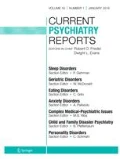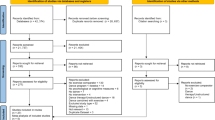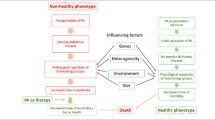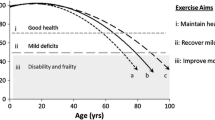Abstract
Converging lines of research indicate that complex mental activity is associated with reduced dementia risk. Thus, intense interest exists in whether different forms of cognitive exercise can help protect against cognitive decline and dementia. However, there is considerable confusion in terminology that is hindering progress in the field. We therefore introduce a concrete definition of cognitive training (CT) and make this the focus of our article. Clinical research that has evaluated CT in normal aging, mild cognitive impairment, and dementia is then critically reviewed. Despite many methodological shortcomings, the overall findings indicate that multidomain CT has the potential to improve cognitive function in healthy older adults and slow decline in affected individuals. Finally, practical issues, including the strengths and weaknesses of commercial products, are explored, and recommendations for further research and clinical implementation are made.
Similar content being viewed by others
References
Papers of particular interest, published recently, have been highlighted as: • Of importance •• Of major importance
Brehmer Y, Li SC, Straube B, et al.: Comparing memory skill maintenance across the life span: preservation in adults, increase in children. Psychol Aging 2008, 23:227–238.
Valenzuela MJ, Sachdev P: Brain reserve and dementia: a systematic review. Psychol Med 2006, 36:441–454.
Valenzuela MJ, Sachdev P: Brain reserve and cognitive decline: a non parametric systematic review. Psychol Med 2006, 36:1065–1073.
Clare L, Woods RT: Cognitive training and cognitive rehabilitation for people with early-stage Alzheimer’s disease: a review. Neuropsychol Rehabil 2004, 14:385–401.
Galante E, Venturini G, Fiaccadori C: Computer-based cognitive intervention for dementia: preliminary results of a randomized clinical trial [in Italian]. G Ital Med Lav Ergon 2007, 29(3 Suppl B):B26–B32.
Cipriani G, Bianchette A, Trabucchi M: Outcomes of a computer-based cognitive rehabilitation program on Alzheimer’s disease patients compared with those on patients affected by mild cognitive impairment. Arch Gerontol Geriatr 2006, 43:327–335.
• Rozzini L, Costardi D, Chilovi V, et al.: Efficacy of cognitive rehabilitation in patients with mild cognitive impairment treated with cholinesterase inhibitors. Int J Geriatr Psychiatry 2007, 22:356–360. This was the first randomized, longitudinal trial of CT in patients with MCI with domain-specific, global cognitive, and psychiatric outcome measures. Significant improvements were found in memory and executive function, as was a reduction in neuropsychiatry symptoms following training intervention.
Talassi E, Guerreschi M, Feriani M, et al.: Effectiveness of a cognitive rehabilitation program in mild dementia (MD) and mild cognitive impairment (MCI): a case control study. Arch Gerontol Geriatr 2007, 44(Suppl 1):391–399.
Spector A, Woods B, Orrell M: Cognitive stimulation for the treatment of Alzheimer’s disease. Expert Rev Neurother 2008, 8:751–757.
Wenisch E, Cantegreil-Kallen I, De Rotrou J, et al.: Cognitive stimulation intervention for elders with mild cognitive impairment compared with normal aged subjects: preliminary results. Aging Clin Exp Res 2007, 19:316–322.
Tarraga L, Boada M, Modinos G: A randomized pilot study to assess the efficacy of an interactive, multimedia tool of cognitive stimulation in Alzheimer’s disease. J Neurol Neurosurg Psychiatry 2006, 77:1116–1121.
Martin M, Clare L, Altgassen M, et al.: Cognition-based interventions for older people and people with mild cognitive impairment. Cochrane Database Syst Rev 2006, 4:006220.
Clare L, Woods B: Cognitive rehabilitation and cognitive training for early-stage Alzheimer’s disease and vascular dementia. Cochrane Database Syst Rev 2003, 4:CD003260.
Oswald W, Gunzelmann T, Rupprecht R: Differential effects of single versus combined cognitive and physical training with older adults: the SimA study in a 5-year perspective. Eur J Ageing 2006, 3:179–192.
Ball K, Berch D, Helmers K: Effect of cognitive training interventions with older adults—a randomized control trial. JAMA 2002, 288:2271–2281.
Brenes GA: Cognitive training may improve targeted cognitive functions in older adults. Evid Based Ment Health 2003, 6:54.
Willis S, Tennstedt SL, Marsiske M: Long term effects of cognitive training on everyday functional outcomes in older adults. JAMA 2006, 296:2805–2814.
Scogin F, Bienias JL:A three-year follow-up of older adult participants in a memory-skills training program. Psychol Aging 1988, 3:334–337.
Stigsdotter N, Backman A: Long -term maintenance of gains from memory training in older adults: two 3 1/2-year follow-up studies. J Gerontol Psychol Sci 1993, 48:P233–P237.
Rapp S, Brenes G, Marsh AP: Memory enhancement training for older adults with mild cognitive impairment: a preliminary study. Aging Ment Health 2002, 6:5–11.
Gunther VK, Schafer P, Holzner BJ, et al.: Long-term improvements in cognitive performance through computer-assisted cognitive training: a pilot study in a residential home for older people. Aging Ment Health 2003, 7:200–206.
Belleville S: Cognitive training for persons with mild cognitive impairment. Int Psychogeriatr 2008, 20:57–66.
Troyer A, Murphy K, Anderson N, et al.: Changing everyday memory behaviour in amnestic mild cognitive impairment: a randomised controlled trial. Neuropsychol Rehabil 2008, 18:65–88.
Heiss WD, Kessler J, Mielke R, et al.: Long-term effects of phosphatidylserine, pyritinol, and cognitive training in Alzheimer’s disease. A neuropsychological, EEG, and PET investigation. Dementia 1994, 5:88–98.
Davis RN, Massman PJ, Doody RS: Cognitive intervention in Alzheimer disease: a randomized placebo-controlled study. Alzheimer Dis Assoc Disord 2001, 15:1–9.
Cahn-Weiner DA, Malloy PF, Rebok GW, Ott OR: Results of a randomized placebo-controlled study of memory training for mildly impaired Alzheimer’s disease patients. Appl Neuropsychol 2003, 10:215–223.
Loewenstein D, Acevedo A, Czaja S, Duara R: Cognitive rehabilitation of mildly impaired Alzheimer disease patients on cholinesterase inhibitors. Am J Geriatr Psychiatry 2004, 12:395–402.
Olazaran J, Muniz R, Reisberg B, et al.: Benefits of cognitive-motor intervention in MCI and mild to moderate Alzheimer disease. Neurology 2004, 2:2348–2353.
Kawashima R, Okita K, Yamazaki R, et al.: Reading aloud and arithmetic calculation improve frontal function of people with dementia. J Gerontol Med Sci 2005, 60A:380–384.
Requena C, Maestu F, Campo P, et al.: Effects of cholinergic drugs and cognitive training on dementia: 2 year follow-up. Dement Geriatr Cogn Disord 2006, 22:339–345.
Clare L: Cognitive training and cognitive rehabilitation for people with early-stage dementia. Rev Clin Gerontol 2003, 13:75–83.
Sitzer DI, Twamley EW, Jeste DV: Cognitive training in Alzheimer’s disease: a meta-analysis of the literature. Acta Psychiatr Scand 2006, 114:75–90.
Papp KV, Walsh SJ, Snyder PJ: Immediate and delayed effects of cognitive interventions in healthy elderly: a review of current literature and future directions. Alzheimers Dement 2009, 5:50–60.
•• Valenzuela MJ, Sachdev P: Can cognitive exercise prevent the onset of dementia? Systematic review of randomized clinical trials with longitudinal follow-up. Am J Geriatr Psychiatry 2009, 17:179–187. This was the first meta-analysis of the effect of CT on longitudinal performance in healthy adults.
Mahncke HW, Connor B, Appelmann J, et al.: Memory enhancement in healthy older adults using a brain plasticity-based training program: a randomized controlled study. Proc Natl Acad Sci U S A 2006, 103:12523–12528.
Tonetta M: TNP—Training Neuropsiclogico di Mario Tonette [software, in Italian]. Stradella, Italy: BEAC-Biomedical; 1998.
Beck C, Heacock P, Mercer S, et al.: The impact of cognitive skills remediation training on persons with Alzheimer’s disease or mixed dementia. J Geriatr Psychiatry 1998, 21:73–88.
Farina E, Fioravanti R, Chiavari L, et al.: Comparing two programs of cognitive training in Alzheimer’s disease: a pilot study. Acta Neurol Scand 2002, 105:365–371.
Barnes D, Yaffe K, Belfor N, et al.: Computer-based cognitive training for mild cognitive impairment. Results from a pilot randomised, controlled trial. Alzheimer Dis Assoc Disord 2009, 23:205–210.
Soloman P, Murphy C: Early diagnosis and treatment of Alzheimer’s disease. Expert Rev Neurother 2008, 8:769–780.
Merzenich M: Neuroscience via computer: brain exercise for older adults. Interactions 2007, 14:42–45.
Lumos Labs: Ongoing research using Lumosity. Available at http://lumosity.com/knowledge-centre. Accessed September 16, 2009.
Thal LJ: Prevention of Alzheimer disease. Alzheimer Dis Assoc Disord 2006, 20(Suppl 2):S97–S99.
Yesavage JA, Friedman L, Ashford W, et al.: Acetylcholinesterase inhibitor in combination with cognitive training in older adults. J Gerontol 2008, 63:288–294.
Valenzuela MJ: Brain reserve and the prevention of dementia. Curr Opin Psychiatry 2008, 21:296–302.
Verghese J, Lipton R, Katz M, et al.: Leisure activities and the risk of dementia in the elderly. N Engl J Med 2003, 348:2508–2524.
Hanon DE: Vascular risk factors, cognitive decline and dementia. Vasc Health Risk Manag 2008, 4:363–381.
Derwinger A, Stigsdotter N, Backman L: Design your own memory strategies! Self-generated strategy training versus mnemonic training in old age: an 8-month follow-up. Neuropsychol Rehabil 2005, 15:37–54.
Sinforiani E, Banchieri L, Zucchella C, et al.: Cognitive rehabilitation in Parkinson’s disease. Arch Gerontol Geriatr 2004, 38(Suppl):387–391.
Acknowledgment
Dr. Valenzuela is supported by a University of New South Wales Vice Chancellor’s Fellowship.
Disclosure
Miss Gates is a former director of HeadStrong Cognitive Fitness, Australia, a commercial, Internet-based CT enterprise, and maintains a financial interest. No other potential conflicts of interest relevant to this article were reported.
Author information
Authors and Affiliations
Corresponding author
Rights and permissions
About this article
Cite this article
Gates, N., Valenzuela, M. Cognitive Exercise and Its Role in Cognitive Function in Older Adults. Curr Psychiatry Rep 12, 20–27 (2010). https://doi.org/10.1007/s11920-009-0085-y
Published:
Issue Date:
DOI: https://doi.org/10.1007/s11920-009-0085-y




